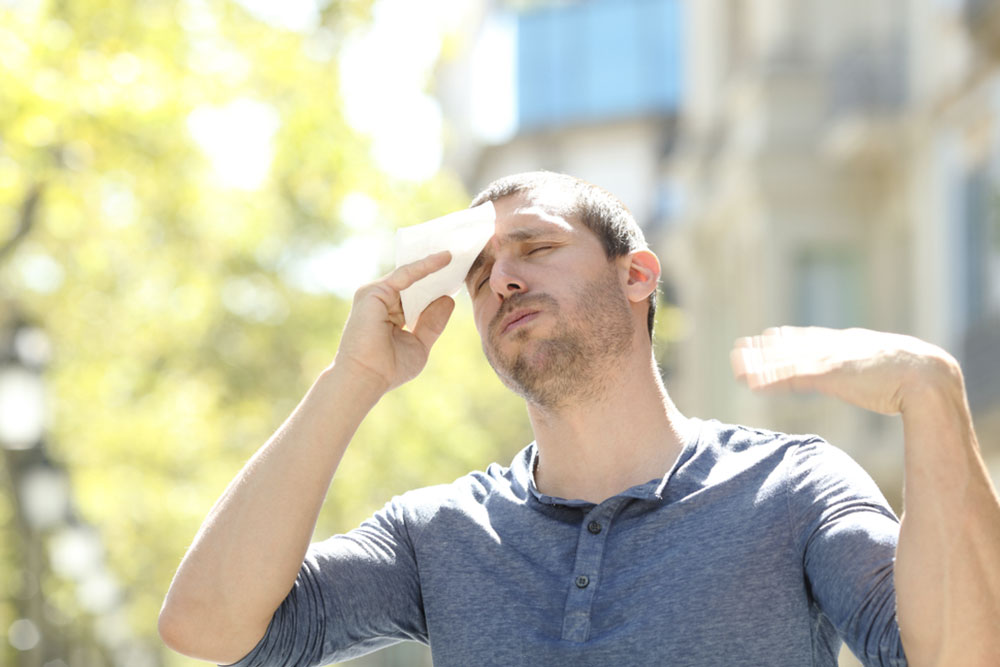10 uncommon signs of dehydration explained

Over 75% of the human body is made up of water. And every day, the body loses fluids that must be replenished by simply drinking water or fluids. Water is critical for maintaining electrolyte balance, promoting blood circulation, and even helping the body flush out toxins through urination. If the fluids are not replenished as and when required, it increases the risk of dehydration. Here are unusual signs of dehydration one must be aware of.
Dark urine
Water helps flush out toxins from the body, where the kidneys purify the blood and evacuate fluids via the bladder. Regular urine is usually pale yellow or a lighter shade in color. But if one notices a darker shade of urine, it is indicative that the body requires more water to enable this process. Similarly, the frequency of urination can also indicate severe dehydration. If the person is not passing urine at all, it is a worrying sign of dehydration that should not be ignored.
Dryness of the skin
Drinking water helps the skin remain more supple. However, reduced water intake can affect this elasticity causing the skin to become dry and extremely rippled. Doctors advise taking a pinch test to see if the skin bounces back into its original texture after a quick pinch. If the shape is not retained and the skin folds stick together, it is a sign of severe dehydration.
Fatigue
People often mistake feeling lightheaded or weak as a sign of hunger. But dehydration can also trigger these symptoms as the body is not able to sustain basic functions. For example, water is necessary to promote better circulation of freshly oxygenated blood. Even the brain tissue is made up of mostly water. So, lack of fluids affecting these organ functions triggers fatigue-like symptoms. Fluids are also necessary to maintain an electrolyte balance that controls vital metabolic functions. In all, without water, organs and vital bodily functions that support these organs start to shut down, resulting in one feeling tired and fatigued.
Poor oral health
Oral problems like bad breath, swelling in the tongue, and dry mouth are also indicative of dehydration. Saliva is produced by the body to keep the mouth and teeth clean. Without sufficient water intake, the body is unable to produce saliva. A prolonged dry mouth also increases the risk of bacteria harboring on the teeth and gums to multiply and produce a bad odor.
Developing a fever
The core body temperature fluctuates due to an electrolyte imbalance caused by dehydration. This abrupt change causes hyperthermia, a condition where the body loses heat rapidly, affecting a person’s high fever. Often these symptoms are confused with having the flu or a viral infection. But fever and chills can also be triggered simply due to a lack of fluids in the body. If water intake is insufficient, doctors suggest one to include electrolyte drinks in daily routine to replenish lost fluids quickly.
Confusion
Over a third of the brain cells are made up of water molecules that support vital functions. Dehydration drains the water from these molecules and as time passes, many of the cognitive functions that rely on healthy brain tissue are affected. Cells degrade due to lack of water and can disrupt neural pathways affecting memory and other cognitive functions. Simply put, not drinking enough water increases the risk of cognitive diseases.
Muscle cramps
One of the more unusual signs of dehydration is developing muscle cramps. Just like other organs and functions in the body, muscle tissue requires water to maintain an electrolyte balance to retain its cell structure. Lack of fluids can cause involuntary contractions of the muscle as blood circulation is affected and also increases tissue sensitivity leading to aches and cramps. Many research studies are conclusive of the fact that not drinking enough water increases the risk of sports injuries impacting the muscle and vital joints. This is one of the reasons why nutritionists suggest remaining hydrated throughout working out to replenish water lost in sweating.
Not sweating enough
Sweating is the body’s natural method of cooling down after any intense activity or workout. The sweat glands also release toxins from the body with the excess fluids being evacuated intermittently. However, not sweating is a sign that the body is lacking the fluids necessary to support the function. The body can only hold a limited quantity of fluids, and if, after strenuous activity, there is no sweat being released, then this is a clear sign of dehydration. Even a reduced tear production indicates that the glands do not have enough water to release tears.
Constipation
The digestive system needs water for regular bowel movements. However, not drinking enough water can make the stools harder to pass, resulting in constipation. Not that constipation is not a direct sign of dehydration, as there are multiple health complications where this is a prevalent symptom. However, if one is not suffering from any of these known complications, having difficulty passing stools can very well be due to reduced water intake.
Sugar cravings
Dehydration affects the body’s metabolic activities that help convert glucose into energy. As a result, one might suddenly notice an increase in cravings for foods, especially sugary items. Very commonly, in fact, people give into these cravings due to lack of nutrition. But the only issue here is the lack of fluids to support the metabolism. Quenching thirst can easily help overcome these urges and prevent excessive eating caused by untimely hunger pangs.
Understand that dehydration can be easily managed by drinking a minimum of eight glasses of water spread throughout the day. That is the recommended amount for a full-grown adult. However, if there are underlying health complications or side effects of certain prescriptions that trigger dehydration, it is advisable to consult with a professional to assess the best course of treatment. In any case, one must never ignore signs of dehydration.







